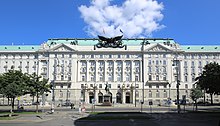Ministry
A ministry ( Latin "service"), in Swiss department (from French département , literally for "[administrative] department"), is a supreme authority of a state . It is regularly headed by a minister or, in Switzerland, by a head of department who belongs to the government of the state.
Historically, at the time of constitutionalism , the term also referred to all ministers.
tasks
The duties of the ministry are usually:
- assisting the minister in carrying out his political duties;
- the supervision of the subordinate agencies and institutions with which it forms the minister's portfolio;
- the independent fulfillment of administrative tasks .
The ministry stands at the interface between political leadership ( gubernative ) and as a non-political administration ( executive in the narrower sense). The activities of the ministerial administration therefore differ from subordinate administrations.
Departments (portfolios)
Ministries have become more and more differentiated throughout history. Historically, this becomes clear z. B. at the Prussian institution of the State Ministry , which included the entire government.
In the 18th and 19th centuries, the classic departments (portfolios) emerged: initially finance , foreign affairs , war or army affairs , and later national defense and justice , then also internal affairs , trade and economics . There is also the minister without portfolio ( minister without portfolio ).
The special departments of individual economic sectors, such as industry , agriculture , forestry , energy supply , post office , transport and the like, and, in the 1980s, also for environmental matters, develop later .
In monarchies there were often ministries of the royal / imperial / ducal / princely etc. house .
In the course of the development of the welfare state , new state tasks were added, the execution of which had to be organized and the establishment of further ministries, for example for work , health , social affairs , family , women , youth .
It is widespread today to assign several individual departments to each minister as a competence portfolio, so that collective ministries arise, such as the Ministry of Agriculture in Austria, which was called the “ Federal Ministry for Sustainability and Tourism ” until 2020 (previously the Federal Ministry for Agriculture, Forestry, Environment and Water Management). Because the social interests and priorities of the political parties, as well as the workforce, change, the names of many ministries change with a change of government or an exchange of ministers.
In Germany you can see the classic ministries of the definite article in the name, ie Ministry of Finance, the interior, the judiciary, the defense, the non-classical ministries perform a contrast to the name, for example. B. Federal Ministry of Food and Agriculture . In Austria, all federal ministries have a “for” in their name.
Departments (administrative term)
In most cases, ministries have the right to issue instructions to a number of subordinate authorities. This affects those authorities that provide the services of the ministry in accordance with the responsible portfolio of skills. From an administrative point of view, the term “department” is therefore also used as a collective term for a ministry including its subordinate authorities.
National
Germany
In Germany as a federally organized state, there are ministries both at the federal level and in the federal states .
- The federal government has federal ministries . They served as federal ministers until the 1980s , even if they were presided over by women. The neutral form was finally introduced by organizational decree.
- The names differ in the countries. Are usual Ministry , State Department or Ministry . Hamburg has authorities as the highest state authorities, Berlin has senate administrations and in Bremen the state authorities are called Der Senator für ... or Die Senatorin für ...
Austria
In Austria, the term Federal Ministry is used to describe each individual government department. In addition to the department heads, the government members who are not at the head of a ministry also have the title of Federal Minister . In total, including the Chancellor and Vice Chancellor, there are thirteen ministries and two Chancellery ministers (as of 2020), and as is customary in Western European countries, most of the tax money is used to promote social security and social justice . Therefore, the Federal Ministry for Social Affairs, Health, Care and Consumer Protection and the Federal Ministry for Labor, Family and Youth have the highest budgets.
Historically, the imperial governments of Cisleithania from 1867 to 1918 were each referred to as a ministry in their entirety (see e.g. the Taaffe II ministry , which was in office for more than 14 years, or the last imperial government, the short-lived ministry Lammasch ).
Ministries exist on the basis of the current Federal Ministries Act . The ministers are appointed or dismissed by the Federal President on the proposal of the Federal Chancellor.
Switzerland
In Switzerland there are seven departments (see also the department principle ) , which assume roughly the same role as ministries and to which, as in Germany and Austria , are assigned federal offices . At the federal level, as in most cantons , their division is a matter for the government and is not laid down in the constitution. At canton level, the departments are also called regional directorates .
Web links
- Literature on the subject of ministry in the catalog of the German National Library
Individual evidence
- ^ Department - Duden , Bibliographisches Institut , 2016; compare also the prefix ' de- ', the foreign word ' Part ' and the ending ' -ment '


